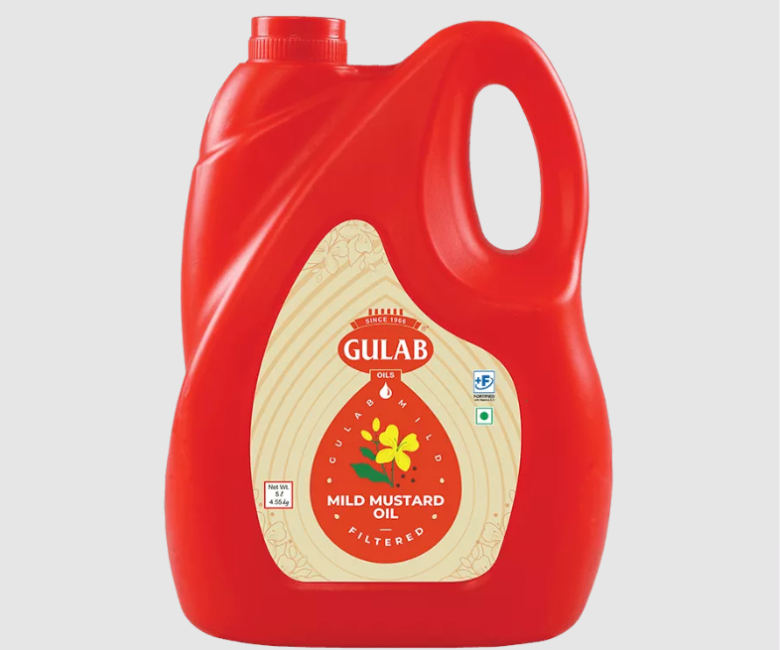What is Mustard oil?
Mustard oil is either the pressed mustard oil for cooking or a pungent essential oil which is commonly termed as a volatile oil of mustard. The essential oil is made from grinding of mustard seeds, mixing them with water and extracting the volatile residue using the process of distillation. You can also create the essential oil by dry distillation. Pressed mustard oil is used for cooking but it’s restricted in a few countries because it has a high level of erucic acid.
Mustard oil is a versatile part of many dishes across the world and is found in almost every kitchen. Its strong flavor helps enhance the taste of the dish and it has a variety of health benefits. However, using excess mustard oil for cooking can lead to an increase in cholesterol and a higher risk of heart diseases. Because of this, people revert to using olive oil, sunflower oil etc. Mustard oil is also beneficial for people with diabetes. Apart from being used in cooking, it is also used for salads, hair, massaging the skin and body and as a baby massage oil. It is one of the healthiest oils for consumption because it has a ratio of omega 3 and omega 6 fatty acids which is apt for our body. It’s available topically as a massage oil, hair serum and for hair treatment.
This article deals with the benefits of mustard oil and how to use it.
Benefits of Mustard oil.
Knowing about the benefits of mustard oil can help understand the appropriate quantity of using it. So, here are eight core benefits of mustard oil –
1) It may help block microbial growth – Mustard essential oil contains powerful antimicrobial properties; this can help block the formation and growth of certain bacteria that may prove harmful. White mustard essential oil decreases the growth of many strains of bacteria and as compared to other essential oils like thyme, mustard essential oil is the most effective at this job. But most research is restricted to test-tube studies.
2) It can help control cough and cold: Mustard oil is used to reduce colds, coughs, allergies and respiratory illnesses. This trend can be viewed since ancient times. Inhaling mustard oil’s steam can help clear congestion. Additionally, it has shown positive effects in patients having sinusitis.
3) It is a great source for MUFA: Mustard oil has a lot of monounsaturated fatty acids and our body requires three parts of them as compared to one part of saturated fatty acids to function efficiently. Mustard oil for cooking is rich in MUFA which is good for the heart and skin and also prevents early graying.
4) Increases and makes red blood cells stronger: Mustard oil has all the fats required for our body to perform its various functions. Mustard oil helps reduce cholesterol and better the structure of RBC membranes.
5) Acts as a stimulating agent: Mustard oil helps stimulate our sweat glands which leads to better blood circulation in our body and lowers the temperature of the body. It also helps reduce toxins from our body. It relieves stressed out muscles by doing so.
6) May help slow down the growth of cancer cells: Mustard oil can help control the growth and spread of cancer cells. In animal studies, it has been shown that in rats, mustard oil helped block the growth of colon cancer as compared to corn or fish oil.
7) It’s very good for the skin: Mustard oil has large quantities of Vitamin E; it is a very necessary nutrient for the skin. It reduces fine lines, wrinkles, acts as a sunscreen and is used to massage babies, too. It also helps reduce tanning and dark spots when used with face masks. Using mustard oil and coconut oil together can improve skin tone. However, it has to be used in limited quantities because too much of it on oily skin or sensitive skin can lead to irritation.
8) It helps promote hair growth: Using mustard oil for hair growth is an age-old benefit of it. It contains beta-carotene which promotes hair growth, activates the circulation of blood and prevents scalp infections. Mustard seed paste combined with mustard oil left overnight can help reduce hair fall.
Now that we’ve covered a few uses of mustard oil, we will now move to discussing how to use it.
How to use Mustard Oil.
Here are some common ways of using mustard oil for its various benefits –
1) It can be used for cooking and frying food and it boosts our immunity.
2) It can be used as a preservative with pickles.
3) It can be inhaled to clear our respiratory system of congestion.
4) It can be massaged on our feet and chest to help with cold and cough.
5) It can be consumed with honey to help in respiratory problems.
6) It can be used in oil pulling for prevention of growth of bacteria and bleeding gums.
7) It can be used as a paste with turmeric and salt to make our gums and teeth healthy.
8) It can be used along with coconut oil to massage the body.
9) It can be used along with cream, turmeric and gram flour to heal dry and chapped skin.
10) It can be used for massaging the scalp which helps improve hair growth and blood circulation. As a deep conditioning moisturizer for hair, it helps prevent dry hair, a flaky scalp, frizzy hair, split ends, hair breakage, heat damage and water damage.
Conclusion
Pure mustard oil is an oil made by pressing the plant’s seeds. It contains higher levels of erucic acid, so it is often used as a flavoring agent. You can use mustard oil for cooking, hair growth control and hair fall reduction, to reduce the growth of cancer cells, to reduce inflammation and pain and to block microbial growth. It can also be applied as a massage oil, face mask and hair serum. It helps improve immunity, gum health and reduce dandruff. It can also be used for treatment of skin problems like eczema, psoriasis, dermatitis and folliculitis. But, if you have a hair-thinning issue or a symptom of an underlying health issue, mustard oil may not be the best option. While mustard oil has a lot of benefits, because it has naturally occurring compounds like erucic acid, capsaicin and a sulfur called allyl thiocyanate, it can be mildly irritating for some people and a bit harmful because it may cause lichen planus (a skin rash), skin and eye irritation and clogged pores.




